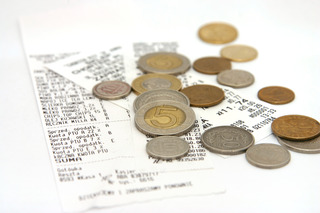It is the only source that can provide a chance for economic breakthrough
Published:
21 March 2005 y., Monday
Money from Russia’s Stabilisation Fund is expected to be invested abroad in dollar-nominated securities, with minimum investment risks and minimum profitability at 2-4%. These funds have until now been kept in Central Bank accounts. This means that a great deal of money will soon appear on the financial markets. On February 1, 2005, the Fund totaled 647.2 billion roubles ($23.1 billion), which mostly came from taxes on oil sales with prices exceeding $20 per barrel and export duties from oil companies.
The crucial question is how this money should be used. Money can only be taken out of the Fund when it has more than 500 billion roubles. Therefore, more than a fifth of its resources can already be used. This is a key issue for Russia’s economy, as the positive overseas market situation in recent years has been almost exclusively responsible for its growth.
However, experts are not tired of repeating that the potential of the resource-oriented Russian economy has been virtually exhausted. The mechanism whereby "we produce oil, sell it and enjoy the benefits" is becoming increasingly less effective. The country is now at a stage when it must introduce an industrial policy. However, any policy only makes sense when there is money to implement it.
Russia’s stock market and banking system do not provide the necessary financing for the real sector of the economy. Direct foreign investment in Russia remains at a very low level, while foreign investment in general is concentrated on either the import of equipment or foreign borrowings. The country obviously needs sources for further growth. The Stabilisation Fund is virtually the only potential source today and a genuine war is being waged for its funds.
Šaltinis:
financialexpress.com
Copying, publishing, announcing any information from the News.lt portal without written permission of News.lt editorial office is prohibited.
The most popular articles
 European cities may still be feeling the pinch of the global recession.
more »
European cities may still be feeling the pinch of the global recession.
more »
 The EBRD Board of Directors has approved a $50 million convertible loan to Petrolinvest to finance the completion of exploration works at the company’s main oilfields.
more »
The EBRD Board of Directors has approved a $50 million convertible loan to Petrolinvest to finance the completion of exploration works at the company’s main oilfields.
more »
 The European Commission welcomes the adoption today at the United Nations in Geneva of the first international regulation on safety of both fully electric and hybrid cars.
more »
The European Commission welcomes the adoption today at the United Nations in Geneva of the first international regulation on safety of both fully electric and hybrid cars.
more »
 Bloomberg has today announced that Lithuania had the outlook on its credit rating raised by Fitch Ratings after the Government implemented an austerity program to curb the budget deficit.
more »
Bloomberg has today announced that Lithuania had the outlook on its credit rating raised by Fitch Ratings after the Government implemented an austerity program to curb the budget deficit.
more »
 In January 2010, compared with December 2009, the highest increase in retail trade in the EU-27 Member States was observed in Lithuania.
more »
In January 2010, compared with December 2009, the highest increase in retail trade in the EU-27 Member States was observed in Lithuania.
more »
 Three thousand former car, refrigerator and construction workers in Germany and Lithuania will get €7.6 million in EU globalisation adjustment fund aid for training, self-employment and job guidance after Parliament gave the green light on Tuesday.
more »
Three thousand former car, refrigerator and construction workers in Germany and Lithuania will get €7.6 million in EU globalisation adjustment fund aid for training, self-employment and job guidance after Parliament gave the green light on Tuesday.
more »
 Some 80% of Europeans continue to travel for their holidays according to a new Eurobarometer survey on ‘The attitudes of Europeans towards tourism 2010’.
more »
Some 80% of Europeans continue to travel for their holidays according to a new Eurobarometer survey on ‘The attitudes of Europeans towards tourism 2010’.
more »
 The EU's internal market will be under scrutiny Tuesday when a series of reports will be debated by MEPs in Strasbourg.
more »
The EU's internal market will be under scrutiny Tuesday when a series of reports will be debated by MEPs in Strasbourg.
more »
 EU Employment and Social Affairs Ministers today agreed on a new facility to provide loans to people who have lost their jobs and want to start or further develop their own small business.
more »
EU Employment and Social Affairs Ministers today agreed on a new facility to provide loans to people who have lost their jobs and want to start or further develop their own small business.
more »
 Over €7.6 million in financial aid for training and self-employment could be available to former workers in German and Lithuanian if MEPs back the measures Tuesday.
more »
Over €7.6 million in financial aid for training and self-employment could be available to former workers in German and Lithuanian if MEPs back the measures Tuesday.
more »